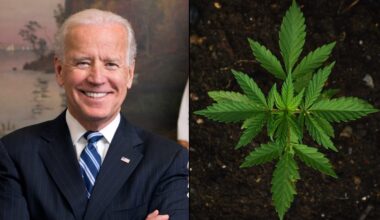An organization representing mayors from across the U.S. adopted a resolution imploring Congress to pass a bill to safeguard banks that work with state-legal marijuana businesses from federal penalties.
The U.S. Conference of Mayors approved the measure during the body’s 90th annual meeting on Monday. Last year, the organization adopted a separate measure calling for an end federal cannabis prohibition and promoting social equity in the industry. The latest resolution on banking also expresses support for federal legalization bills, including one that passed the House and another that’s being finalized by Senate leadership.
The mayors’ proposal this year focuses on marijuana banking reform, which comes at a pivotal time as Congress considers including the bipartisan Secure and Fair Enforcement (SAFE) Banking Act as part of a large-scale manufacturing bill that’s currently being negotiated in bicameral conference.
The whereas section of the measure states that “the conflict between state law and the illegality of cannabis under federal law creates significant challenges and barriers for legally-owned and operated recreational and medical cannabis dispensaries and cannabis-related companies.”
It goes on to say that “cannabis companies are unable to access banking services that financial institutions and insurers offer to other businesses due to the potential for severe criminal and civil penalties,” which forces many operators to operate on a largely cash-only basis that has led to a surge of targeted crime.
The mayors of Tacoma, Washington; Fort Lauderdale, Florida; and Henderson, Nevada sponsored the resolution for the organization, which represents the 1,400 U.S. cities with populations of 30,000 or more.
“Now, therefore, be it resolved, that The United States Conference of Mayors urges Congress to pass the SAFE Banking Act of 2021 to provide financial security for cannabis dispensaries and related companies and enhance public safety,” it says.
“Be it further resolved, that The United States Conference of Mayors supports federal legislation legalizing the medicinal use of cannabis and the adult use of recreational cannabis, including the Marijuana Opportunity Reinvestment and Expungement (MORE) Act (H.R. 3617) and the Cannabis Administration and Opportunity Act (CAOA),” the resolution states.
There was no debate on the cannabis resolution during the U.S. Conference of Mayors executive session on Monday at which measures that were previously approved in committees of the organization over the weekend were passed by the full body on voice votes.
In 2018, the mayors’ organization said the federal government should remove cannabis from the list of controlled substances and also called on cities in states that have legalized marijuana to expunge people’s past convictions.
Even earlier, in 2013, the group approved a resolution demanding that the federal government respect local cannabis laws. That measure, coordinated by Marijuana Moment’s editor through his prior advocacy organization Marijuana Majority, was unanimously approved.
A 2019 survey found that a majority of American mayors want cannabis to be legalized and sold in their cities.
The National League of Cities (NLC), an organization founded in 1924 to empower local governments, similarly passed a resolution in 2018 calling for the removal of cannabis from the Controlled Substances Act, as well as a separate measure on giving marijuana businesses access to banking services.
The National Association of Counties, which represents the roughly 3,000 county governments across the U.S., has also urged the federal government to allow states to legalize marijuana without interference. Members adopted a platform plank in 2018 saying “the federal government should largely be responsible for regulating and enforcing against illegal drug trafficking, while respecting states’ right to decriminalize cannabis under state law.”
The National Conference of State Legislatures (NCSL) has adopted a number of pro-reform resolutions over time, including one in 2018 that said the federal government needs to end marijuana prohibition so that states can enact their own cannabis policies without intervention.
With respect to marijuana banking, a coalition of marijuana advocacy groups recently launched a campaign meant to promote education about the need for the incremental reform, highlighting what they see as the social and economic equity advantages of freeing up businesses in the industry to access traditional financial services.
The vehicle that most stakeholders and advocates are closely paying attention to as a possible means of enacting the SAFE Banking Act is the manufacturing bill in conference called the America COMPETES Act.
The conference committee held its first meeting on that bill last month, with multiple appointed conferees urging the body to attach the SAFE Banking Act language in the interest of economic competitiveness and public safety.
But while the SAFE Banking Act has passed the House in some form six times as this point, a key barrier is Senate leadership, which is working to finalize a bill to comprehensively end federal prohibition. A top aide for Senate Majority Leader Chuck Schumer (D-NY) recently tempered expectations about the prospects of moving marijuana banking through the America COMPETES Act.
For his part, Rep. Earl Blumenauer (D-OR), an appointed conferee on the manufacturing bill, separately said that he feels there “tremendous momentum” to get the marijuana banking job done through their negotiations.
Asked by Marijuana Moment whether there are any specific, equity-centered policies that he’s discussed adding to the SAFE Banking Act with Senate leadership, Blumenauer said that he’d “prefer not to go into” discussions he may have had with Senate colleagues, and he put the onus on the opposite chamber to propose any specific changes that would make the legislation more palatable to them.
“They have the opportunity to move something forward, and I welcome those efforts,” he said. “I’m perfectly willing to work with them as far as they can go as long as it doesn’t get in the way of solving this.”
The standalone Senate version of the SAFE Banking Act currently has 42 cosponsors, including nine Republicans.
That reluctance on the Senate side was also the subject of a letter that SAFE Banking Act sponsor Rep. Ed Perlmutter (D-CO) sent to leadership last month.
In a previous statement to Marijuana Moment, Perlmutter pointed out that “more than two-thirds of the conferees have already voted for or cosponsored the SAFE Banking Act.”
The congressman has even made a point to talk about enacting the reform legislation during committee hearings on ostensibly unrelated or wider-ranging legislation, like at a recent House Rules Committee hearing.
Despite recently saying that he’s “confident” that the Senate will take up his bill this session, Perlmutter recognized that while he’s supportive of revisions related to criminal justice reform, taxation, research and other issues, he knows that “as we expand this thing, then we start losing votes, particularly Republican votes and we got enough votes in the Senate to do it” as is.
Rep. Maxine Waters (D-CA), who chairs the House Financial Services Committee and previously listed marijuana banking as a legislative priority ahead of the conference, said that the bipartisan nature of the reform proposal is “evident” based on the fact that the House included it in the chamber’s version of the manufacturing bill before it was removed in the Senate.
Additionally, nearly a quarter of all senators sent a bipartisan letter this month urging that cannabis banking be included in the final bill.
The third-highest-ranking Democratic member in the Senate, Sen. Patty Murray (D-WA), has taken special interest in marijuana banking reform, describing it as a priority of hers as an appointed member on the bicameral conference committee.
Meanwhile, an organization that represents state financial regulators from across the U.S., the Conference of State Bank Supervisors (CSBS), is separately putting pressure on Congress to pass marijuana banking reform.
Banking associations representing all 50 states and one U.S. territory also sent a letter to Senate leaders in April that made similar points about the importance of enacting the SAFE Banking Act.
Last month, a coalition of cannabis regulators representing 40 U.S. states and territories separately explained to Congress what the current lack of access to traditional financial services means—not just for the businesses and the programs they oversee, but for the regulators navigating this federal-state conflict themselves.
The non-partisan Cannabis Regulators Association (CANNRA), which doesn’t take a stand on legalization itself, sent a letter to congressional leaders, outlining areas of concern for their states’ respective marijuana markets under the status quo of federal prohibition.
But not everyone is accepting the idea that SAFE Banking alone will provide the relief and resources to disadvantaged communities that proponents are arguing it will.
Cannabis Regulators of Color Coalition has also weighed in on the cannabis banking conundrum, arguing in a Marijuana Moment op-ed that the SAFE Banking Act is insufficient. The group says advocates should push to add provisions to the bill providing interim safeguards for Community Financial Depository Institutions (CFDIs) and Minority Depository Institutions (MDIs), as well as measures to prevent predatory lending and promote loan availability for people from disadvantaged communities.
Meanwhile, the governor, attorney general and other top officials in Washington State sent a letter to congressional leaders last month, again emphasizing the urgent need to pass marijuana banking reform as a public safety imperative.
The number of banks that report working with marijuana businesses ticked up again near the end of 2021, according to recently released federal data.
It’s not clear if the increase is related to congressional moves to pass a bipartisan cannabis banking reform bill, but the figures from the Financial Crimes Enforcement Network (FinCEN) signal that financial institutions continue to feel more comfortable servicing businesses in state-legal markets.
Some Republicans are scratching their heads about how Democrats have so far failed to pass the modest banking reform with majorities in both chambers and control of the White House, too. For example, Rep. Rand Paul (R-KY) criticized his Democratic colleagues over the issue in December.
Voters In Five Texas Cities Will Decide On Marijuana Decriminalization In November, Activists Say
Medical Disclaimer:
The information provided in these blog posts is intended for general informational and educational purposes only. It is not a substitute for professional medical advice, diagnosis, or treatment. Always seek the advice of your physician or other qualified healthcare provider with any questions you may have regarding a medical condition. The use of any information provided in these blog posts is solely at your own risk. The authors and the website do not recommend or endorse any specific products, treatments, or procedures mentioned. Reliance on any information in these blog posts is solely at your own discretion.







